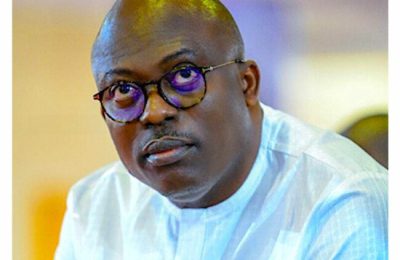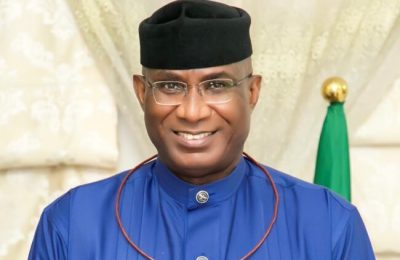
Professor Damilola Sunday Olawuyi (SAN), a globally recognised professor of Energy and Environmental Law is currently a United Nations Independent expert representing Africa on the UN Working Group on Business and Human Rights. The Global Vice Chair of the International Law Association in this interview with YEJIDE GBENGA-OGUNDARE, speaks on why Nigerians must elect a President with a clear foreign policy agenda that will ensure a just and equitable deal for Nigeria and Africa in the ongoing decarbonization and low carbon energy transition and on issues of environmental law, among others.

What is the way forward for Nigeria and other African countries on the ongoing emphasis on decarbonisation, climate change and low carbon transition on the economy?
The global oil and gas industry is undergoing significant transformations due to unequivocal scientific studies that show the urgent need to reduce global emissions of greenhouse gases (GHGs) that contribute to climate change to net-zero by the year 2050, consistent with the Paris Agreement and the United Nations Sustainable Development Goals. However, while the need for a low-carbon economy is incontrovertible, a sudden global divestment from the oil and gas industry may have catastrophic development impacts in Nigeria and the rest of Africa. Studies have already expressed the fear that Africa may become the sacrificial lamb for net zero and decarbonization. In countries such as Nigeria where the oil and gas sector contributes to more than 80 percent of the country’s revenue as well as foreign exchange earnings, a sudden divestment from the sector may result in significant job loss, unemployment, and may halt the flow of financing needed to develop critical healthcare, education, water and energy infrastructure, leaving a huge dent on the realization of all aspects of the United Nations Sustainable Development Goals in Nigeria. I am therefore a strong advocate for a just and inclusive global decarbonization agenda that balances the interests, priorities and needs of developing countries. First, international law already emphasizes the need to achieve the global net-zero goals on the basis of equity, and in the context of sustainable development and efforts to eradicate poverty. This provides a strong basis for Nigeria and other African countries to demand that ongoing global emphasis on decarbonization and low carbon energy transition must be done in a just, inclusive and rights-based manner such that no country is left behind. Second, apart from the climate emergency, the world also faces an energy poverty emergency, which we must never lose sight off. This is 2023, and currently more than 1 billion people (13% of the world’s total population) still lack access to electricity, with about 600 million of those in Africa. Even in Nigeria, constant supply of electricity, reliability and affordability remain key issues. African countries therefore need to articulate a foreign policy agenda that balances these two equally important priorities. There is a need to harness lower carbon and environmentally preferable transition fuels, such as natural gas, that will help combat the current energy poverty emergency facing our world.
Ahead of the 2023 elections, what do you think is the most important step for Nigeria in achieving such balanced foreign policy agenda?
The 2023 election provides an important and timely opportunity, to analyze the foreign policy strategies of the leading presidential candidates to see to what extent they will be able to achieve a just and equitable deal for Nigeria in the ongoing decarbonization and low carbon energy transition. One positive news is that all the leading presidential candidates have clearly identified energy security and climate change as urgent priorities for a sustainable and prosperous economic development in Nigeria, which is commendable. What I would however like to see more of, is a clear and comprehensive strategy for leveraging the global emphasis on low carbon transition as a tool for attracting climate financing into key sectors of Nigeria. For example, Article 9 of the Paris Agreement clearly provides that developed countries shall provide financial resources to assist developing countries with respect to both climate change mitigation and adaptation. A number of climate financing mechanisms have therefore been put in place, that if we key into, could provide significant inflow of international capital that could in no time establish Nigeria as a hub for climate technology entrepreneurship, and clean energy development projects, such as green hydrogen projects. For example, in addition to clean technology mechanism and climate finance funds under the United Nations climate regime, countries such as India, China, Brazil and South Africa are already leveraging climate financing options such as concessional climate infrastructure loans, green bonds, climate guarantees, and debt for climate swaps from international sources to implement green economy activities in the energy and other sectors. For example, given Nigeria’s leading role as a natural gas supplier, the net-zero transition provides significant opportunities for Nigeria to become a leading hub for blue and green hydrogen projects that can enable us to sustain progress in terms of advancing energy security, net-zero transitions, economic resilience and all the SDGs. These are all urgent foreign policy issues of our time which Nigeria cannot afford to take the back seat on. Nigerians must therefore elect a President with the clearest agenda and the most competent team to secure the best international deal that does not make the country the sacrificial lamb for unjust global energy transition. We cannot afford to continue to frame climate change and net-zero as some environmental issue alone, rather net-zero and the SDGs must underpin all aspects of Nigeria’s economic planning, infrastructure development and foreign policy.
How can you assess Nigeria’s readiness to achieve the SDGs?
In 2015, Nigeria joined other countries of the world to commit to the attainment of the UNSDGs by the year 2030. The 17 SDGs reflect global aspirations to end hunger and poverty, and accelerate progress on energy security, health, education, gender equality, economic growth, conservation of water, biodiversity, natural resources, and tackling climate change amongst others. This is 2023, so we have exactly seven years left to achieve all of these important targets and goals. While the current administration, through the Office of the Senior Special Advisor to the President on SDGs, has made significant progress over the last years in placing the SDGs at the heart of governance and decision making, we see that we are now in a race against time, so we must double such efforts over the next 4 to 8 years. For example, due to the fierce urgency, you see that countries such as the United Kingdom, Poland, Qatar and the United Arab Emirates (UAE) have established specific Ministries for Climate Change. The United Kingdom has also appointed a Minister of State for Climate Change, while Canada and Hungary have established the positions of Ombudsman for SDGs and Future Generations. These are strategies aimed at ensuring highlighting and elevating sustainability as top government priority which also enhances a country’s climate diplomacy at the international level. Such emphasis can also enhance the integrated and coordinated efforts in the pursuit of all aspects of the SDGs in Nigeria. One of the key challenges to the SDGs in Nigeria is the tendency for various agencies, ministries, and entities to pursue sustainability projects and strategies without adequate coordination and collaboration. At the heart of the SDGs is the need for multistakeholder partnership and interoperability that will ensure that all government projects and planning in all sectors and ministries are underpinned by a common national SDG strategy. The next administration will be leading Nigeria towards the final phase of the 2030 target date for the SDGs, so it is highly imperative for us to get it right. We should see very clearly at this stage the SDG strategy and framework that will be implemented by the next dispensation to place sustainability as a top government priority and foreign policy.
By attaining the rank of full professor of law in 2015 at the age of 32, being named as Deputy Vice Chancellor (ABUAD) at 36, and then a Senior Advocate of Nigeria (SAN) rank in 2020 at the age of 37, you became the youngest academic SAN in Nigeria, what are the challenges you faced in achieving these unprecedented feats?
Well, I am indeed humbled and honoured to have been able to record these important milestones in my career. I am very fortunate to have tapped into the visions of the President and Founder of Afe Babalola University, Ado Ekiti (ABUAD), Aare Afe Babalola, SAN, OFR, LL.D, CON, who is well known to be a selfless and cerebral mentor that has trained more than 1000 lawyers and produced 24 Senior Advocates of Nigeria. Working closely with him has greatly inspired and challenged me to be the best in my teaching, research and service to the nation. Aare Afe Babalola’s accomplishments, from very humble beginnings, are enough motivation for everyone associated with ABUAD to push for the greatest heights, break existing records and set new ones. The university and college of law provided the right atmosphere and resources for me to achieve these milestones. Without the support and best wishes of everyone, ranging from the president and founder of the university, to the senior management of the university, the Vice Chancellor, Professor E. Smaranda Olarinde, to my head of department, and my students, this attainment would have been highly impossible. I faced no barrier; all I saw was motivation, encouragements and opportunities.
You are an alumnus of the Harvard and Oxford University, tell us more about your background and you were able to achieve these?
I owe these achievements to the divine grace of God. I am the last child in a family of six. My mother had no formal education while my father’s highest degree was a primary school certificate, as his parents had no funds to sponsor him any further. He became a steel welder in the process, and later managed with his little education to build a successful construction business. He was therefore very determined to do all that was humanly possible to ensure that all his children will at least graduate from the university. His dream came through as all my siblings are now medical doctors and engineers. I am the first and only lawyer in my family and generation. I grew up reading about famous lawyers such as Aare Afe Babalola (SAN) and Chief Gani Fawehinmi (SAN) of blessed memory, and I secretly admired their commitment to justice and societal development. These naturally developed in me a strong passion for social development issues. I was privileged to have achieved first class honours in law from Igbinedion University, and another first class from the Nigerian Law School, which earned me a full scholarship by the Government of Alberta, Canada to obtain a Master of Laws (LL.M.) from the University of Calgary, Canada. From Calgary, I received another full scholarship to go to Harvard University for another LL.M, and while still at Harvard, I received the Queen of England’s Overseas Research Scholarship to study for a PhD at Oxford University. After this, I was called to the bar in Canada and then practiced energy law at the global law firm, Norton Rose Fulbright Canada, for a while and then to Qatar. Having received so much support and mentoring from institutions abroad, what I hope to continue to do is to leverage my experience studying and working in Africa, North America, Europe, Asia and the Middle East to contribute to national and international sustainability efforts, and to motivate and inspire the next generation.
What is your advice for students?
My advice for them is that they should not be tired of new knowledge. As a student or young lawyer, they should condition their minds like a funnel, that is, absorbing new knowledge in a wide range of areas and specialism, and then gradually narrowing down to suit their most passionate interest. Law is very wide, so one should not be in a hurry to permanently label oneself to one narrow area. Learning requires humility, patience, diligence, hard work and building professional networks and interest in diverse areas. Such mental curiosity and desire to know more is the secret of success, whether as a practicing lawyer, legal academic, university administrator or even politician. To deliver value, one must aspire at the beginning to learn something about everything and be seen as a reliable professional by colleagues and clients at all times. In the end, money flows in the direction of those that consistently bring value.
ALSO READ FROM NIGERIAN TRIBUNE








